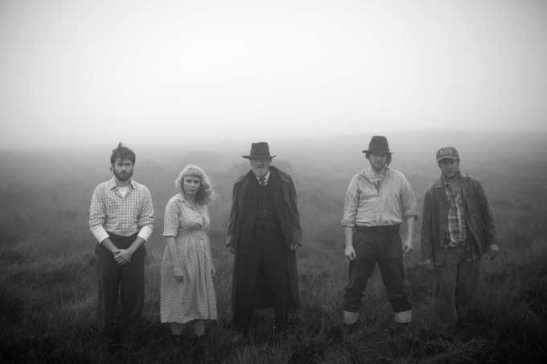Corn Exchange performs Eugene O’Neill’s 1924 play in Northern Irish accents, placing the emphasis very much on the first part of its hyphenate identity Irish-American.
Peter (Peter Coonan) and Simeon (Luke Griffin) are hardworking brothers on a stony farm in 1850s New England. Their resentful half-brother Eben (Fionn Walton) is convinced the farm is really his thru his mother, their father’s second wife. But when their father Ephraim Cabot (Lalor Roddy) unexpectedly remarries, they realise the farm is nobody’s but his new wife Abby’s (Janet Moran) as when he finally dies she’ll inherit. Peter and Simeon, disgusted at this, sign over to Eben their shares in ‘his farm’, and head off to California’s gold rush. But when Abby realises the brooding Eben’s staying, and a threat to her marriage for social status, she promises to give Ephraim a son; to ensure her place on the farm. But she might prefer to have a child with her virile step-son, rather than her wizened husband. And if her manipulations are unmasked, then all hell will break loose…
Corn Exchange oddly abandons its commedia dell’arte style for this mash-up of Greek tragedy and Irish-American land-hunger, when you’d imagine the heightened nature of retelling the tortured romantic triangle of Phaedra, Hippolytus and Theseus would be perfectly suited for that technique. Director Annie Ryan strips the play to its core, reducing a cast of 20 to just 5 actors who play out the tragedy on Maree Kearns’ bare stage with just a table, a bed, and some firewood and building timbers running up against an abstract backdrop. O’Neill doesn’t leaven his plays with much humour though, and this approach means that the rawness of Desire Under the Elms can be overwhelming. Luke Griffin sports the best worst hair I’ve seen in some time, and he and Coonan are fantastically dishevelled and avaricious as the animalistic brothers Simeon and Peter. It is a loss after the interval when they don’t reappear.
The monstrous patriarch is so hyped that Roddy takes some time in living up to his billing when he arrives. But this feels like a John B Keane play relocated to Maine. Ephraim is as monomaniacal as Bull McCabe on the subject of how he sweated blood to tame nature. He wants to give his farm to a son, so that even when he’s dead, in a way the land will still belong to him. O’Neill’s script reaches its apex of vivid imagery when Ephraim describes how otherwise he’d rather set fire to the farm and free the livestock. But opposite him Moran and Walton disappoint. Her unsubtle seduction doesn’t convince as patent manipulation leading to sincere love, his melodramatic contradictory reactions don’t ring true with his character’s rigidity hitherto, and after the interval their falling-out feels rushed – there’s too much of a steep descent to the brutally Greek climax.
It’s sometimes hard to square O’Neill, the Nobel laureate and Broadway intellectual, with the brutal toiling characters that populate his plays. This production, in emphasising the Irish elements, casts an interesting light on O’Neill.
3/5
Desire Under the Elms continues its run at Smock Alley Theatre until October 13th.

